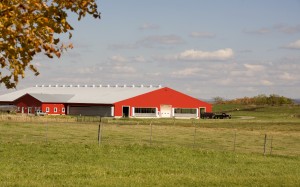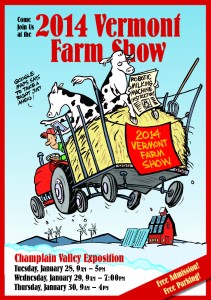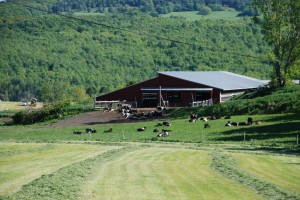This was posted as an April Fools joke on April 1, 2014.
We are not aware of any activity that resembles the post written below but we had quite a bit of fun exploring the possibilities. Enjoy.
Here in Vermont we have a small number pig milk start-ups that are combining new research and some good-old creativity to find a niche.Farm business adviser Sam Smith at the Intervale Center says, “I see pig milk and the related products as the next big opportunity for our producers here in Vermont. We have a couple of farmers who have been experimenting and their success has led me to think this is going to be a very lucrative market. If you look at it purely from the perspective of the number of teats per animal, you have three times the amount of teats than a cow, which means three times the profitability!”
What are the reasons for pigs milk? First is the potential to ramp up production quickly. Pig breeding cycles are relatively short making it easy for a farmer to build a herd of milking pigs quickly. Smith says “This is another game changer when compared to cow or goat dairies. You can have a pig dairy online in under six months with a lower capital investment, a great option for beginning farmers. And when you need replacement pigs you have plenty to choose from.”
Pigs, like humans, are a mono gastric species that digests food with one stomach. With a diet closer to humans than cows, pigs milk is also more similar to human breast milk. This amounts to a more digestible and less allergy prone-product. Artisan cheese makers have also been experimenting with the milk as a potential way to further diversify their offerings. Alison Lancet, who operates the farmstead cheese operation magnolia dairy said “We have produced some wonderful blooming rind cheeses with pig’s milk, and plan to have them for sale within the next three months.” Pigs milk is high in fat and is considered ideal for new products like restorative health products. These are part food and part medicine to assist in treating nutritional problems and skin conditions.
Locavore groups nationally have noted that many regulations placed on direct on-farm milk sales are specific to cow or goats milk. Pigs milk is seen as a way to promote community access to farm based products without conflicting with current regulations.
Industry leaders have quietly been evaluating other products too. Many people don’t know that the once iconic 100% pig-skin football has been replaced with mix of natural and synthetic materials to improve it’s grip. Recent pig breeding programs focused on improvements to meat yields had the trade-off of leaner animals which impacted the texture of pig skin. Since 2002 a partnership between American football companies and several in Australian have been evaluating pig skin trials from heritage pig breeds. These are the same breeds being evaluated for dairy production! What a great fit for high school sports programs re-evaluating ways to integrate sustainability into student learning!



